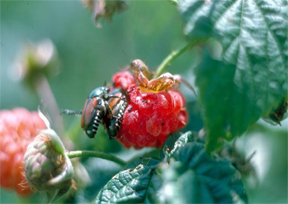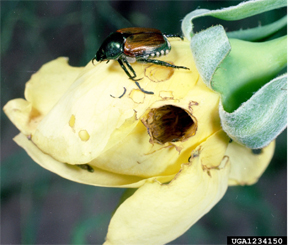Why are we seeing so few Japanese beetles this summer?
Editor’s note: This article is from the archives of the MSU Crop Advisory Team Alerts. Check the label of any pesticide referenced to ensure your use is included.
Many people in the southeast Michigan are very happy about the reduced numbers of Japanese beetles that they have seen this summer. Some have called and asked if it is because of our biological control program with the protozoan pathogen, Ovavesicula popilliae. Although Ovavesicula has established well, it is still too early in most of Southeast Michigan to cause a sudden decline of Japanese beetles. Ovavesicula will take about five years after the initial introduction to effect the numbers of Japanese beetles in your garden.
So what did happen? Most likely, we are seeing fewer Japanese beetles in areas where the soil was dry last year in July and August. Japanese beetle grubs do not survive well in dry soils. If it was very dry last July and August, the adult beetles would try to avoid laying eggs in the dry turf and soil, and if it was moist when they layed eggs, then became very dry later, the grubs did not survive. Since adult Japanese beetles fly around an area the size of two football fields or more, then all the turf within an eighth of a mile of your house could be producing beetles that will find their way to your lawn and garden. If most of that turf was dry last year, then few beetles emerged this summer.
Another thing that happened this summer is the cool weather. At cool temperatures, beetles are not as active as during warm temperatures. So, even if we had the same number of beetles, you would see less activity during a cool summer.
But this idea that Japanese beetle grubs survive best in moist soil means that they will survive well this summer and fall, so lots of beetles will emerge next summer, probably much more than what we saw this summer.



 Print
Print Email
Email




